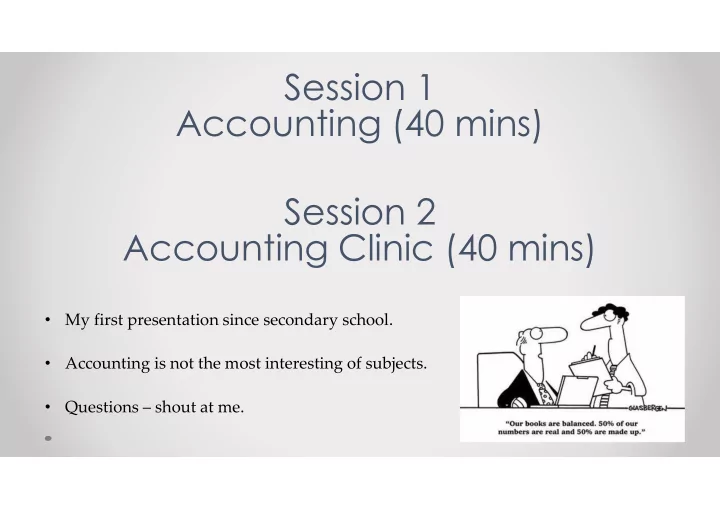

Session 1 Accounting (40 mins) Session 2 Accounting Clinic (40 mins) • My first presentation since secondary school. • Accounting is not the most interesting of subjects. • Questions – shout at me.
Bit Of Intro • You must choose a business structure if you’re starting a business that helps people or communities (a ‘social enterprise’). • If you want to set up a business that has social, charitable or community- based objectives, you can set up as a: • limited company • charity, or from 2013, a charitable incorporated organisation • co-operative • community interest company (CIC) • unincorporated
Why Do I Need To Do Accounts? Having an accurate record keeping system which you keep up to date will help you: • pay the right amount of tax (if applicable) • avoid paying any extra tax or penalties (if applicable) • keep track of your expenses • see quickly what you are owed by others and how much you owe them • ask for a bank loan or credit or grant if you need to • save time and accountancy costs • receive the right amount of benefits or credits
Boring Bits • Standard Accounting Concepts – apply regardless of the status of your business. • Who is responsible for keeping the records in check? - Constituted Group = Treasurer or Nominated Responsible Individual - Limited Company = Directors - Charity = Finance Officer
The Fundamental To ALL Accounts Debit (DRrive On Left) Credit (CRrash On The Right) Expenses Liabilities Assets Income Drawings Capital What is Double Entry?
An Introduction to B ookkee ping The Process 1. Source Documents 2. Books / Spreadsheets 3. Ledgers 4. Trial Balance 5. Financial Statements
1. Source Documents • Invoices, Receipts, Bank Statements, Petty Cash, Letters, Grants, Agreements, KEEP EVERYTHING! • Keep for 6 years. • Date Order / Alphabetical / Digital / Paper / Whatever Suits You!
2. Books / Spreadsheets • Use your bank account! Why? What is the biggest problem with Cash? • Best Practice Spreadsheets • Bank Control / Bank In / Bank Out / Cash Control / Cash In / Cash Out
3. Ledgers
4. Trial Balance
5. Financial Statements Scrap the pennies!
5. Financial Statements (Cont.) Assets – Liabilities = Reserves
5. Financial Statements (Cont.)
Things You Do Normally Need To Worry About • True and Fair View • Accruals Concept Income and Expenses need to be ‘matched’ Revenue Grants should be recognised over the life time of the period Capital Grants should be deducted from the cost of the asset Recognising fixed assets > £250 (or significant size) And yes .. Depreciate them over the Useful Economic Lives! (a non-cash flow) • Grant Conditions and Specific Reserves > Restricted VS Unrestricted
Things You Don’t Normally Need To Worry About • Corporation Tax – income being grants normally tax exempt. • VAT • Payroll
Law - Limited Companies - Companies Act 2006 - Accounting Framework: FRSSE 2008 or 2015, being replaced FRS 102 - Charities - Charities Act 2011 - Accounting Framework: Charities SORP (Statement of Recommended Practice) 2015
Again is the accounting different? • No. Remember, double entry bookkeeping is the same for all entities. • Is the presentation different? • Yes. • Limited Companies – Directors Report & Additional Notes • Charities – Trustees Report & Distinction Between ‘Unrestricted Funds’ and ‘Restricted Funds’
I’ve Heard Of These Things Called CIC’s… • Yes, you probably have, it even has it’s own regulator!! The key thing distinguishing community interest companies is the asset lock. Only 35 per cent of a CIC's distributable profits in any one year can be paid out in private dividends to shareholders; the rest is locked in to further the CIC's mission
Recommend
More recommend